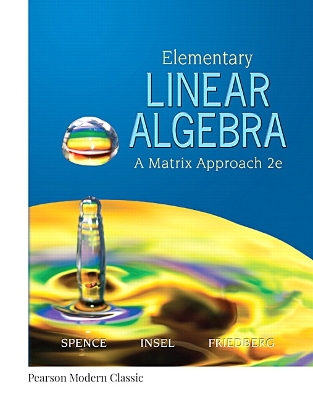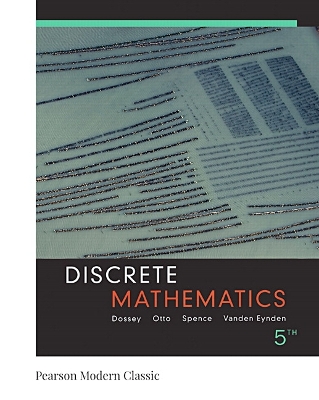Pearson Modern Classics for Advanced Mathematics
2 total works
Elementary Linear Algebra (Classic Version)
by Lawrence E Spence, Arnold J Insel, and Stephen H Friedberg
Published 20 March 2017
For a sophomore-level course in Linear Algebra
This title is part of the Pearson Modern Classics series. Pearson Modern Classics are acclaimed titles at a value price. Please visit www.pearsonhighered.com/math-classics-series for a complete list of titles.
Based on the recommendations of the Linear Algebra Curriculum Study Group, this introduction to linear algebra offers a matrix-oriented approach with more emphasis on problem solving and applications. Throughout the text, use of technology is encouraged. The focus is on matrix arithmetic, systems of linear equations, properties of Euclidean n-space, eigenvalues and eigenvectors, and orthogonality. Although matrix-oriented, the text provides a solid coverage of vector spaces
This title is part of the Pearson Modern Classics series. Pearson Modern Classics are acclaimed titles at a value price. Please visit www.pearsonhighered.com/math-classics-series for a complete list of titles.
Based on the recommendations of the Linear Algebra Curriculum Study Group, this introduction to linear algebra offers a matrix-oriented approach with more emphasis on problem solving and applications. Throughout the text, use of technology is encouraged. The focus is on matrix arithmetic, systems of linear equations, properties of Euclidean n-space, eigenvalues and eigenvectors, and orthogonality. Although matrix-oriented, the text provides a solid coverage of vector spaces
Discrete Mathematics (Classic Version)
by John Dossey, Albert Otto, Lawrence E Spence, and Charles Vanden Eynden
Published 15 June 2017
This title is part of the Pearson Modern Classics series. Pearson Modern Classics are acclaimed titles at a value price. Please visit www.pearsonhighered.com/math-classics-series for a complete list of titles.
An ever-increasing percentage of mathematic applications involve discrete rather than continuous models. Driving this trend is the integration of the computer into virtually every aspect of modern society. Intended for a one-semester introductory course, the strong algorithmic emphasis of Discrete Mathematics is independent of a specific programming language, allowing students to concentrate on foundational problem-solving and analytical skills. Instructors get the topical breadth and organizational flexibility to tailor the course to the level and interests of their students.
An ever-increasing percentage of mathematic applications involve discrete rather than continuous models. Driving this trend is the integration of the computer into virtually every aspect of modern society. Intended for a one-semester introductory course, the strong algorithmic emphasis of Discrete Mathematics is independent of a specific programming language, allowing students to concentrate on foundational problem-solving and analytical skills. Instructors get the topical breadth and organizational flexibility to tailor the course to the level and interests of their students.

